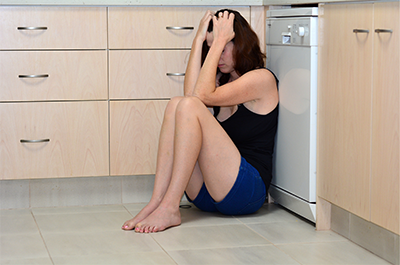Irritable and Overwhelmed? Signs of Parental Burnout

You’re not just feeling overwhelmed, stressed, or irritable. You may be experiencing signs of parental burnout. Parenting children with ADHD and other health conditions can cause increased stress. Job pressures, the ongoing COVID-19 pandemic, and rising prices from inflation create additional strain, causing many parents to struggle with managing day-to-day responsibilities.
Working mothers especially are reporting more burnout, but they aren’t the only ones facing additional stress. Fathers can suffer from burnout, too. Parents who experience burnout may feel trapped, lonely, and disconnected. Reframing, scheduling time to do things they enjoy every day, and mindfulness are some of the ways that parents who are facing burnout can lower their stress levels.
What is meant by burnout?
A study from The Ohio State University reported that sixty-six percent of parents are struggling with parental burnout. Parenting can be stressful, but parental burnout happens when chronic stress and exhaustion are so overwhelming they get in the way of a parent’s daily functioning. Parenting during the pandemic has been a major source of stress leading to burnout, several study participants noted.
“I am expected to be a superhuman,” says one parent, “that I can be a full-time employee, parent, elementary school teacher, preschool teacher, cook, cleaner, playmate, and emotional support system. But I can’t do it any longer.”
Isabelle Roskam, PhD, and Moïra Mikolajczak, PhD, developed the Parental Burnout Assessment after studying the experiences of nine hundred parents. They discovered that parental burnout occurs in three stages:
- physical and emotional exhaustion
- emotional distancing, when parents separate emotionally from their children to conserve energy
- lack of parental fulfillment.
Those at risk for burnout tend to be single parents, parents of children with ADHD or other special needs, and immigrant and Black families who may lack economic security and community support.
“Burnout is the result of too much stress and the absence of resources to cope with it,” says Dr. Roskam. “You will burn out only if there is an imbalance between stress and resources.”
Parental burnout can be prevented with increased awareness, according to The Ohio State University study. Greater awareness, researchers found, enabled more parents to recognize they were experiencing burnout, which led them to reach out for support. Parents who reached out for help during the study reduced their stress. Their children’s levels of stress also decreased.
Where to find support?
Parental burnout can lead to anxiety, depression, substance use, and an increase in parents’ insulting, criticizing, or spanking their children, according to the study results. If you are experiencing burnout, it’s important to reach out for help. This may include talking with your doctor or a mental health professional, especially if your symptoms interfere with your ability to carry out daily tasks. Taking note of how you are feeling, both now and during the course of days or a few weeks, can help you recognize parental burnout and take steps to improve your wellbeing.
“The key is to take care of yourself so that you can take care of your child with ADHD,” says Andrea Chronis-Tuscano, PhD, a former member of CHADD’s professional advisory board and professor of clinical psychology at the University of Maryland. Find time time to do things that you enjoy every day, she recommends, such as listening to your favorite music, exercising, or spending time on hobbies. Asking your spouse or co-parent or a neighbor to take look after your children while you spend thirty minutes exercising or take time on something for yourself can help reduce your stress.
Parents of children with ADHD can find themselves caught in negative patterns of thinking. In most families, parents set the tone, and if a parent is stressed, it is likely that their child will also feel stressed, says Dr. Chronis-Tuscano. She urges parents to be more aware of their negative thinking, because this can affect how they interact with their children.
“Try to catch those negative thoughts and replace them with more positive thoughts,” says Dr. Chronis-Tuscano. “It can really make a difference in how you react to your children.”
Mindfulness is another way to cope with stress from parental burnout. Mindfulness is “learning to drop into awareness; learning to drop into what is happening in the present moment; letting go of any preconceived notions or expectations and just allowing yourself to witness things as they are,” says Lidia Zylowska, MD, associate professor at the University of Minnesota and author of The Mindfulness Prescription for Adult ADHD.
Mindfulness, she says, can help you be more aware of how you are feeling and, with practice, can help you feel calmer. Even spending five or ten minutes a day being present in the moment or practicing deep breathing can be helpful in reducing parental burnout.
Read more on coping with parental burnout:
- Emotional Stressors of Parenting a Child with ADHD
- ADHD and Family Stress
- Managing Stress When You Have ADHD
- Find Your Own Way to Practice Mindfulness
Join the discussion: How do you handle feelings of burnout as a parent?
